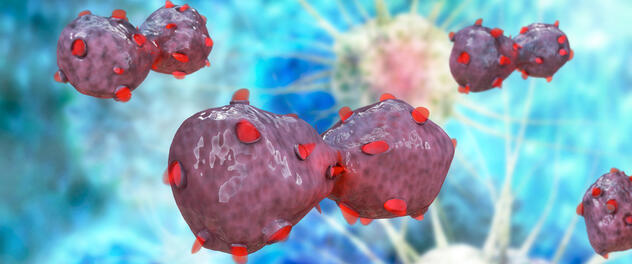 Targeting lung cancer and pancreatic cancer
Targeting lung cancer and pancreatic cancer
Our lab is developing novel models to identify and validate cancer drivers and explore the pathways regulated by cancer-associated genes.
Overview
The Molecular Mechanisms of Tumorigenesis Laboratory led by principal investigator Verline Justilien, Ph.D., studies how aberrant gene expression alters signal transduction pathways to contribute to tumor initiation, maintenance and progression. A better understanding of this process will help uncover vulnerabilities that can be therapeutically targeted to treat lung cancer and pancreatic cancer.
Research in the Molecular Mechanisms of Tumorigenesis Lab centers on target identification through genomic analysis of human tumors and validation, drug discovery and translation to clinical trials. Our research team uses a combination of clinical tumor specimens; genomic and bioinformatic, molecular and biochemical analyses; 2D and 3D cell-based studies; novel genetically engineered mouse models; patient-derived models; and targeted therapeutics.
Our lab is developing novel models to identify and validate cancer drivers and explore the pathways regulated by cancer-associated genes. Specifically, we engineer novel mouse models to carry genetic alterations identified in human tumors to study the involvement of these alterations in lung tumorigenesis. These mouse models allow us to study the stepwise pathological progression of tumors, identify critical cellular and molecular events associated with the distinct histopathological stages, and uncover drivers that initiate different stages of cancer progression. The study of this stepwise development presents an opportunity to therapeutically intervene at a clinically meaningful, early point in the progression of cancer.
In addition, we have created 3D ex vivo organoid culture systems to study the earliest steps in lung cancer transformation. We also have developed lung orthotopic transplantation techniques to successfully propagate ex vivo transformed cells as tumors in recipient mice.
Our work is providing novel insights into how lung and pancreatic cancer stem cells (CSCs) function. We're working on methods to identify, isolate and grow cancer stem cells in the laboratory so that we can better study their functions.
Specifically, we're characterizing cancer stem cells at a molecular level to define genes and pathways that are critical for their maintenance and their enhanced malignant phenotypes. We're investigating the role that molecules exchanged between CSCs and other cells of the tumor play in tumor maintenance, progression, relapse and chemoresistance. We're also studying how CSCs communicate with other cells within the tumor. We think that our efforts will be of value in developing novel therapeutic strategies that will target the cancer stem cell niche in tumors.
Uncontrolled growth and invasiveness are key characteristics of cancer cells. Our lab has made significant advances in elucidating complex signaling mechanisms that oncogenes use to fuel the rapid growth of tumor cells and promote invasion. In addition, we're developing strategies based on the insight gained from our studies to therapeutically target these abberant properties of tumor cells.
About Dr. Justilien
Dr. Justilien is a research cancer biologist at Mayo Clinic in Florida and an assistant professor of cancer biology at Mayo Clinic College of Medicine and Science. Dr. Justilien's goal is to enhance the understanding of lung cancer and pancreatic cancer in a clinically meaningful way. She aims to identify oncogenic drivers of lung and pancreas tumorigenesis and their associated oncogenic signaling pathways to improve understanding of lung and pancreas cancer initiation and pathological progression. This knowledge will enable identification of markers for early detection and diagnosis of lung and pancreatic cancer and will facilitate the design of innovative treatment strategies.